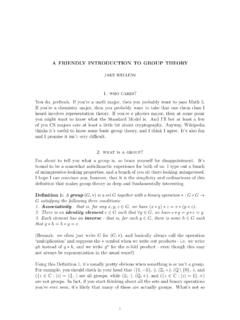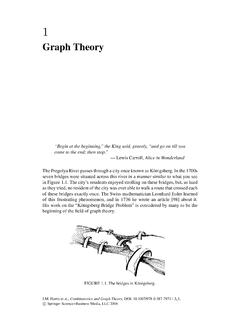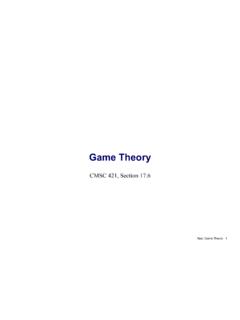Transcription of Core Concepts of Jean Watson’s Theory of Human Caring ...
1 2010 watson Caring Science Institute Page 1 Assembled by Wagner Core Concepts of jean watson s Theory of Human Caring / Caring Science The Core Priniciples/Practices: Evolving From Carative to Caritas ( watson , 2008, p. 34) Practice of loving-kindness and equanimity Authentic presence: enabling deep belief of other (patient, colleague, family, etc.) Cultivation of one s own spiritual practice toward wholeness of mind/body/spirit beyond ego Being the Caring -healing environment Allowing miracles (openness to the unexpected and inexplicable life events) Core Concepts of the Theory : A relational Caring for self and others based on a moral/ethical/philosophical foundation of love and values Transpersonal Caring relationship (going beyond ego to higher spiritual Caring created by Caring Moments ) Moral commitment to protect and enhance Human dignity Respect/ love for the person honoring his/her needs, wishes, routines, and rituals Caring Consciousness of self as person/nurse and other as person connection as Human beings Heart-centered/healing Caring based on practicing and honoring wholeness of mind-body-spirit in self and each other Inner harmony (equanimity) maintaining balance Intention of doing for another and being with another who is in need (What (skills) you do and how ( Caring conscious intention) you do it.)
2 Authentic Presence (honoring/connecting Human to Human ) Caring Occasion/ Caring Moment: Heart-centered Encounters with another person When two people, each with their own phenomenal field /background come together in a Human -to- Human transaction that is meaningful, authentic, intentional, honoring the person, and sharing Human experience that expands each person s worldview and spirit leading to new discovery of self and other and new life possibilities. Multiple ways of knowing (through science, art, aesthetic, ethical, intuitive, personal, cultural, spiritual) Reflective/meditative approach (increasing consciousness and presence to the humanism of self and other) (see Cara, C. (2003). A Pragmatic View of jean watson s Caring Theory , (under continuing education) Understanding self through reflection/meditation (journaling, the arts, meditation, etc.))
3 O What is the meaning of Caring for the person/families/myself? o How do I express my Caring consciousness and commitment to my patients/clients? To colleagues? To the institution? To the community and larger world? o How do I define self, nurse, person, environment, health/healing, and nursing? o How do I make a difference in people s life and suffering? o How do I increase the quality of people s healing and dying process? o How can I be informed by the clinical caritas processes in my practice? o How can I be inspired by watson s Caring Theory in my practice? Page 2 2010 watson Caring Science Institute Assembled by Wagner Understanding the patient/client/family as a person: Inviting story (Tell me about yourself, your life experiences, your feelings, your bodily sensations, your goals and expectations, your culture, etc.)
4 , so I may honor you and your healing pathway.) Understanding the patient/client s health needs: o Tell me about your health? What is it like to be in your situation? o Tell me how you perceive yourself? What are your health priorities? o How do you envision your life? o What is the meaning of healing for you? Caring is inclusive, circular, and expansive: Caring for self, Caring for each other, Caring for patients/clients/families, Caring for the environment/nature and the universe. Caring changes self, others, and the culture of groups/environments. watson s 10 Carative Factors redefined as Caritas Processes: Guidelines for putting Love/Heart-Centered Caring practice into action: 1. Practicing loving-kindness and equanimity within context of Caring consciousness. 2. Being authentically present and enabling, and sustaining the deep belief system and subjective life world of self and one-being cared for.
5 3. Cultivating one s own spiritual practices and transpersonal self, going beyond ego self. 4. Developing and sustaining a helping-trusting, authentic Caring relationship. 5. Being present to, and supportive of the expression of positive and negative feelings. 6. Creatively using self and all ways of knowing as part of the Caring process; engaging in artistry of Caring -healing practices. 7. Engaging in genuine teaching-learning experience that attends to wholeness and meaning, attempting to stay within other s frame of reference. 8. Creating healing environment at all levels, whereby wholeness, beauty, comfort, dignity, and peace are potentiated. 9. Assisting with basic needs, with an intentional Caring consciousness, administering Human care essentials, which potentiate alignment of mind-body-spirit, wholeness in all aspects of care.
6 10. Opening and attending to mysterious dimensions of one s life-death; soul care for self and the one-being-cared for; allowing and being open to miracles. 2010 watson Caring Science Institute Page 3 Assembled by Wagner Evolution of jean watson s Carative Factors/Caritas Processes Over Time Carative Factors (1979, 1985) Caritas Processes (2002-2008) (Some agencies/individuals refer to the Caritas Processes as Caring Practices. ) Caritas Literacy (Competencies) (from draft of working document subgroup of International Caritas Consortium, June 2007, jean watson , et al.; modified by jean watson , Jan. 30, 2008) from watson , J. (2008). Nursing: The Philosophy and Science of Caring (rev. ed.), Boulder: University Press of Colorado ( ). Caritas Consciousness 1 Formation of humanistic-altruistic system of values Practicing loving-kindness and equanimity within context of Caring consciousness.
7 Wording of other systems using watson s Theory : Embrace altruistic values and practice loving kindness with self and others. Practice acts of kindness. (Hebrew Rehabilitation Center[HRC]) My respect for this patient (others) allows me to be available to him/her: Opens to connectedness w/ self, others, environment, universe; Models self-care and Caring for others. Validates uniqueness of self and others. Acknowledges acts of kindness. Honors own and others gifts and talents. Recognizes vulnerabilities in self and others. Treats self and others with loving kindness. Listens respectively with genuine concern to others. Accepts self and others as they are. Demonstrates respect for self and others. Listens to others. Treats others with kindness. Pays attention to others. Respects others.
8 Honors Human dignity of self and others. 2 Instillation of faith-hope Being authentically present and enabling and sustaining the deep belief system of self and one being cared for. Wording of other systems using watson s Theory : Instill faith and hope and honor others Instill trust and hope by being available to meet the needs of others. (HRC) By listening, I was able to honor this patient s (other s) belief system and enable him/her to feel his/her own sense of faith/hope. Creates opportunity for silence/reflection/pause. Promotes intentional Human connection with others. Views life as a mystery to be explored rather than a problem to be solved. Able to release control to a higher power. Interacts with Caring arts and sciences to promote healing and wholeness. Incorporates other s values, beliefs, and what is meaningful and important to them into care plan.
9 Utilizes appropriate eye contact and touch. Calls others by their preferred name. Helps others to believe in themselves. Learns about and supports others beliefs. Supports others sense of hope. Encourages others in their ability to go on with life. Views person as Human being and not object. Page 4 2010 watson Caring Science Institute Assembled by Wagner 3 Cultivation of sensitivity to oneself and others Cultivating one s own spiritual practices and transpersonal self, going beyond ego self (working from a more full consciousness of heart-centeredness opening to all chakras) Wording of other systems using watson s Theory : Be sensitive to self and others by nurturing individual beliefs, personal growth, and practices. Nurture individual spiritual beliefs and religious practices. (HRC) By being more responsive to the patient s(other s) needs and feelings, I was able to create a more trusting-helping- Caring relationship.
10 Practices self-reflection (journaling, prayer, meditation, artistic expression); demonstrates willingness to explore one s feelings, beliefs and values for self-growth. Practices discernment in evaluating circumstances and situations vs. being judgmental. Develops meaningful rituals for practicing gratitude, forgiveness, surrender, and compassion. Accepts self and others on a basic spiritual level as unique and worthy of our respect and Caring . Transforms tasks into healing interactions. Demonstrates ability to forgive self and others. Demonstrates genuine interest in others. Values the intrinsic goodness of one s self and others as Human beings. Practices from heart-center 4 Development of a helping-trusting ( Human Caring ) relationship Developing and sustaining a helping-trusting authentic Caring relationships.








